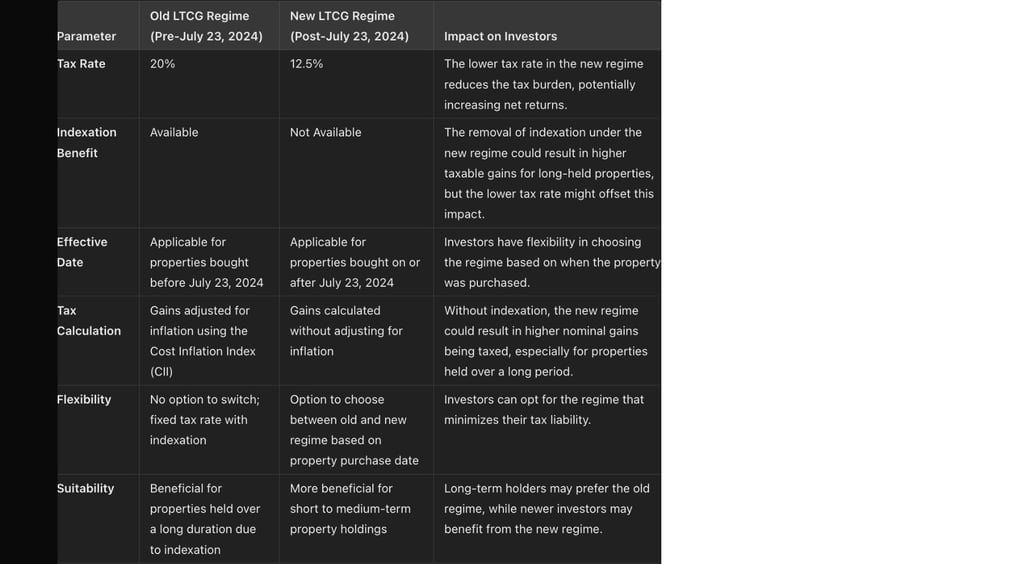
Own a Share in Premium Residential & Commercial Properties Starting from Just ₹15 Lakhs. Secure, Profitable, and Accessible Investments Await!
Unlock Massive Wealth with Real Estate: Why Smart Investors Are Ditching Traditional Assets for Property Gains
Discover the New Tax Breaks and Strategies Making Real Estate the #1 Choice for Maximising Returns in 2024 and Beyond
2 min read


Impact on Investor Returns
Old Regime: The 20% tax rate with indexation benefits is favourable for properties held over long periods, as it effectively reduces the tax liability by accounting for inflation, resulting in lower taxable gains.
New Regime: The 12.5% tax rate without indexation might be more appealing for short-to-medium-term investors, where inflation has a minimal effect on property value, providing lower immediate tax outgo.
Advantages of Real Estate Investing
Tangible Asset: Real estate is a physical asset that provides utility and can be leveraged for personal use or rental income, offering both immediate and long-term benefits.
Capital Appreciation: Property values tend to increase over time, providing substantial capital gains, especially in urban and high-demand areas.
Income Generation: Real estate can generate regular rental income, adding a steady cash flow to the investor's portfolio.
Diversification: Real estate adds diversification to an investment portfolio, reducing overall risk compared to holding only equities or bonds.
Leverage Opportunity: Investors can use mortgages to purchase property, allowing them to control a large asset with a smaller initial investment, enhancing potential returns.
Real Estate vs. Bonds and Invoice Discounting Instruments
Real Estate offers long-term capital growth, income potential, and leverage opportunities, making it ideal for investors seeking both growth and passive income.
Bonds provide fixed income with lower risk but usually offer lower returns compared to real estate. They are suitable for conservative investors seeking stability.
Invoice Discounting offers higher short-term returns compared to bonds but carries credit risk. It's more suited for investors with a higher risk appetite seeking quick returns.
Leveraging Real Estate Investment
Mortgage Financing: Investors can use loans to acquire property, magnifying returns on equity.
Rental Income: Provides a steady income stream that can help cover loan repayments or generate surplus income.
Appreciation: Over time, properties can appreciate significantly, boosting total returns.
Real estate is particularly attractive in markets with stable or rising property values, and the new LTCG regime offers flexibility in tax planning for savvy investors.
We're glad you enjoyed this post on "Unlock Massive Wealth with Real Estate". In our newsletter, we delve deeper into these topics and provide actionable tips and strategies to help you achieve your investing goals.
Stay ahead of the curve and subscribe to our newsletter for the latest insights and solutions!
Still Stuck? Ask Away
Write us at hello@realproft.com with any questions you have about real estate investing. We're here to help you find the perfect way to invest in your future!
Email us: hello@realproft.com
Social media
Subscribe to our newsletter to stay up-to-date with all the latest news and updates. By subscribing, you will receive regular emails containing valuable information, exclusive promotions, and exciting announcements. Don't miss out on this opportunity to join our community and be part of the conversation.
Call us: +91 7678255904
